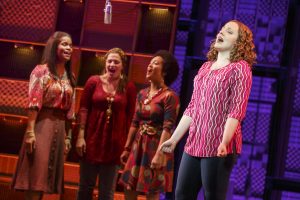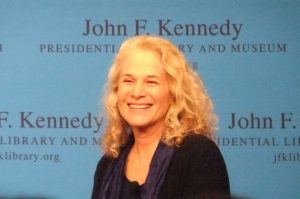Carole King’s Life and Times Fuel a ‘Beautiful’ Musical
If you watched last month’s Democratic National Convention, you might have happened on a performance by Carole King, who sang her “You’ve Got a Friend” as a nod to Hillary Clinton’s campaign and to the party’s platform and principles. On a subsequent interview with CBS-TV, King talked of her commitment to Democrat causes and how she’s been going door to door on the candidates’ behalves, eloquently recounting her experiences and espousing the theory that America just works better when its political process includes as many people as humanly possible.
Carole seems like an incredibly nice girl to boot (and we should all look so good at 74) — but you don’t come by that kind of generosity without a healthy dose of life’s seamier side behind it. That’s part of the success behind Broadway San Diego’s excellent Beautiful: The Carole King Musical: The title character is portrayed not only as the prodigious kid she was but also as the unflaggingly persistent wife, mother and composer whose life was touched by compromise from within and without.
This is an enormously spirited piece of anecdote, its production values vying for space alongside King’s longevity. She’s much, much more than “It’s Too Late” and “I Feel the Earth Move”; she’s been writing songs for major acts since before she was born, and Beautiful fetes her soft-rock skill without ever seeping into the death-knell that adulation so often precedes.

Carole King (Abby Mueller, right) lights up one of her many girl-group clients en route to her legendary place in music. Photo by Joan Marcus.
A piano-playing fool since age 4, Carole Klein was born in Manhattan in 1942 and raised in Brooklyn by her mom Genie, who insists that hell itself is slightly more reputable than Times Square. Her daughter, she predicts, will meet with fates untold should she seek Midtown representation for her songs — but those fates turned their backs when the younger Klein hooked up with hitmaker Donnie Kirshner.
Kirshner’s ear for music and Klein’s obvious talent were part and parcel; Klein and/or lyricist husband Gerry Goffin were responsible for more than a dozen hits of the ’60s, many of which are standards. They include “Will You Love Me Tomorrow” (1960, The Shirelles, written when Klein was 17); “It Might As Well Rain Until September” (written in 1962 for Bobby Vee and covered by Klein); “Up on the Roof” (1962, The Drifters); “The Loco-Motion” (1962, ‘Little Eva’ Boyd, Klein’s babysitter); “A Natural Woman” (1967, Aretha Franklin); and “Pleasant Valley Sunday” (1967, The Monkees).
By then, Klein had moved to Los Angeles, found her singing voice and had adopted King as her stage name — but that was nothing amid the changes awaiting her and Goffin as the ’60s upheaval took hold. Four tousled working-class Brits and a bitter iconoclast from Hibbing, Minn. were changing the face of American music and culture, and Goffin was suffering the ill-effects of drug use and his own wanderlust. Yet there a suddenly single King sat undaunted, plugging away with her disarmingly straightforward piano style and plain-spoken take on the human experience.
One of the cool things about this show is that everybody involved is so blooming nice.
The rest is history, which has judged her most kindly. Billboard magazine would go on to name her the most successful female songwriter from 1955 to 1999, noting she’d charted 118 singles on the magazine’s top 100 list. Add her definitive album Tapestry, her four Grammys and her one Emmy, and it doesn’t get a lot better.
One of the cool things about this show is that everyone involved is so blooming nice. Even Goffin comes back at the end to offer King an apology gift (a book on music arrangement); and Kirshner, a major player in music production and scouting for talent, is a happy-go-lucky entrepreneur with all the courage of conviction he needs.
The acclaimed songwriting team of Barry Mann and Cynthia Weil figure into the King-Goffin profession and personal sphere; their competition’s almost too friendly, with one couple grousing only minimally about the other’s success. Good and bad congeal into a show whose central figure deserves every good thing her talent can bestow.
Wonderful Abby Mueller (whose sister Jessie plays the title role in the current Broadway entry) sounds remarkably like King when she sings, and that’s not just a compliment for its own sake — the other performers (the Drifters, the Chiffons, the Righteous Brothers et al.) work amid exaggerated, cheesy ’60s backdrops and Susan Draus’ lavish music direction; director Marc Bruni has thus drawn a more conspicuous comparison with King’s meat-and-potatoes persona. Liam Tobin’s Goffin has the right idea, but Douglas McGrath’s libretto insufficiently explains Goffin’s break with reality. Curt Bouril’s Donnie Kirshner is the light entrepreneurial force the show needs, but the role could be bigger.

In the spirit of her Democrat sensibilities, Carole King was interviewed at the John Fitzgerald Kennedy Library in 2012. Public domain photo.
Ben Fankhauser’s Mann and Becky Gulsvig’s Weil make excellent subtext, their voices a mix of admiration and frustration over the King/Goffin successes. Suzanne Grodner’s Genie is an ideal fair-weather mom, bombastically grabbing credit for her kid’s foray into professional songwriting.
Meanwhile, scenic and custome designers Derek McLane and Alejo Vietti were probably up nights collaborating on the seamless nature of their crafts; same with lighting designer Peter Kaczorowski and sound man Brian Ronan. The pop-up sets achieve the intended effect, and the garb is insanely descriptive.
King is kind of the Leon Russell among female songwriters — like Leon, Carole has been involved seen and unseen in some of this country’s best composition and arrangement, and her efforts have opened untold doors for female writers duly influenced. Beautiful is a case in point — every so often, and regardless of party affiliation, good things do indeed happen to good people. Very, very nice.
This review is based on the media night performance of Aug. 3. Beautiful: The Carole King Musical runs through Aug. 7 at Civic Theatre, 3rd Avenue and B Street downtown. $22-$138. 619-570-1000, broadwaysd.com.

Martin Jones Westlin, principal at editorial consultancy Words Are Not Enough and La Jolla Village News editor emeritus, has been a theater critic and editor/writer for 25 of his 47 years…
More…


